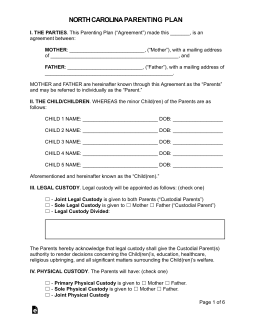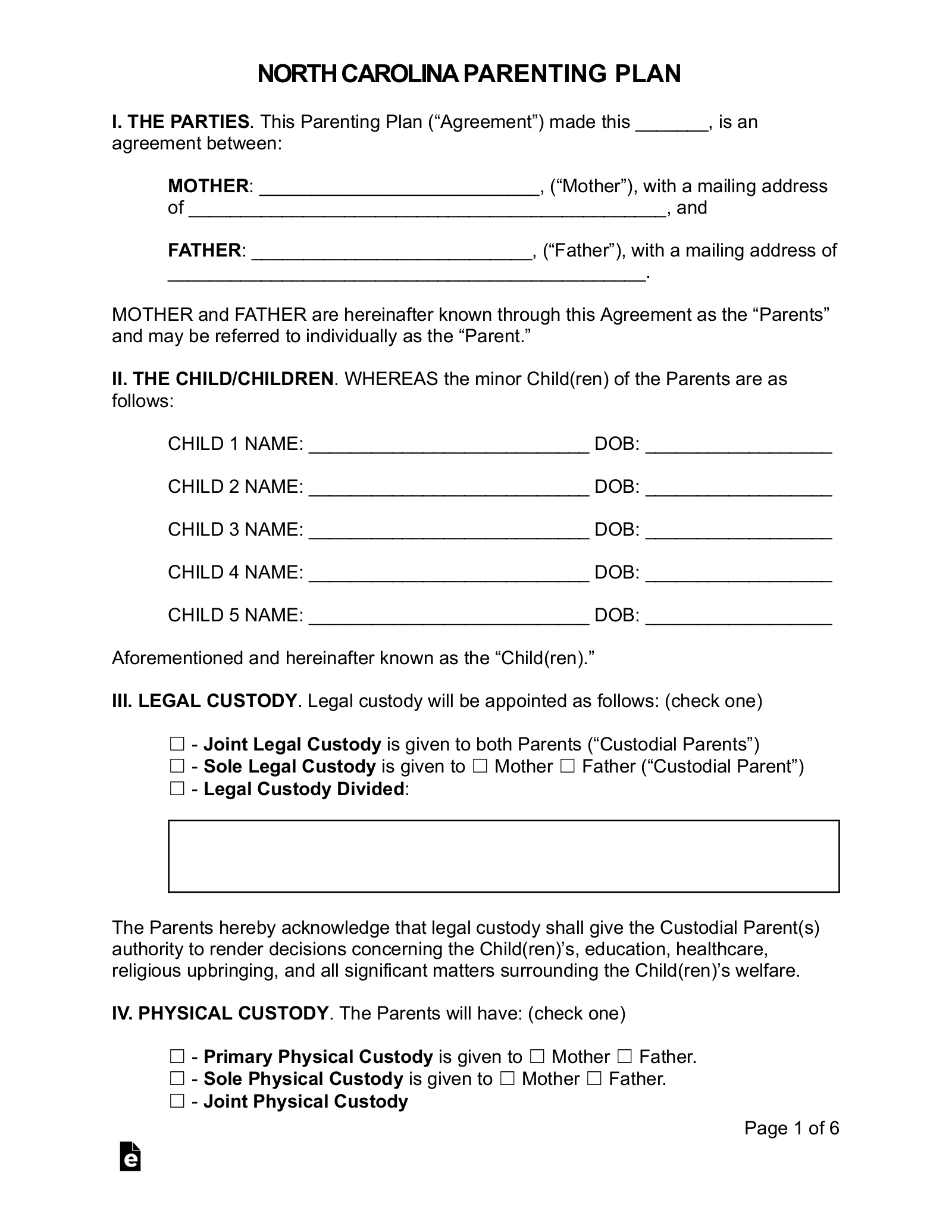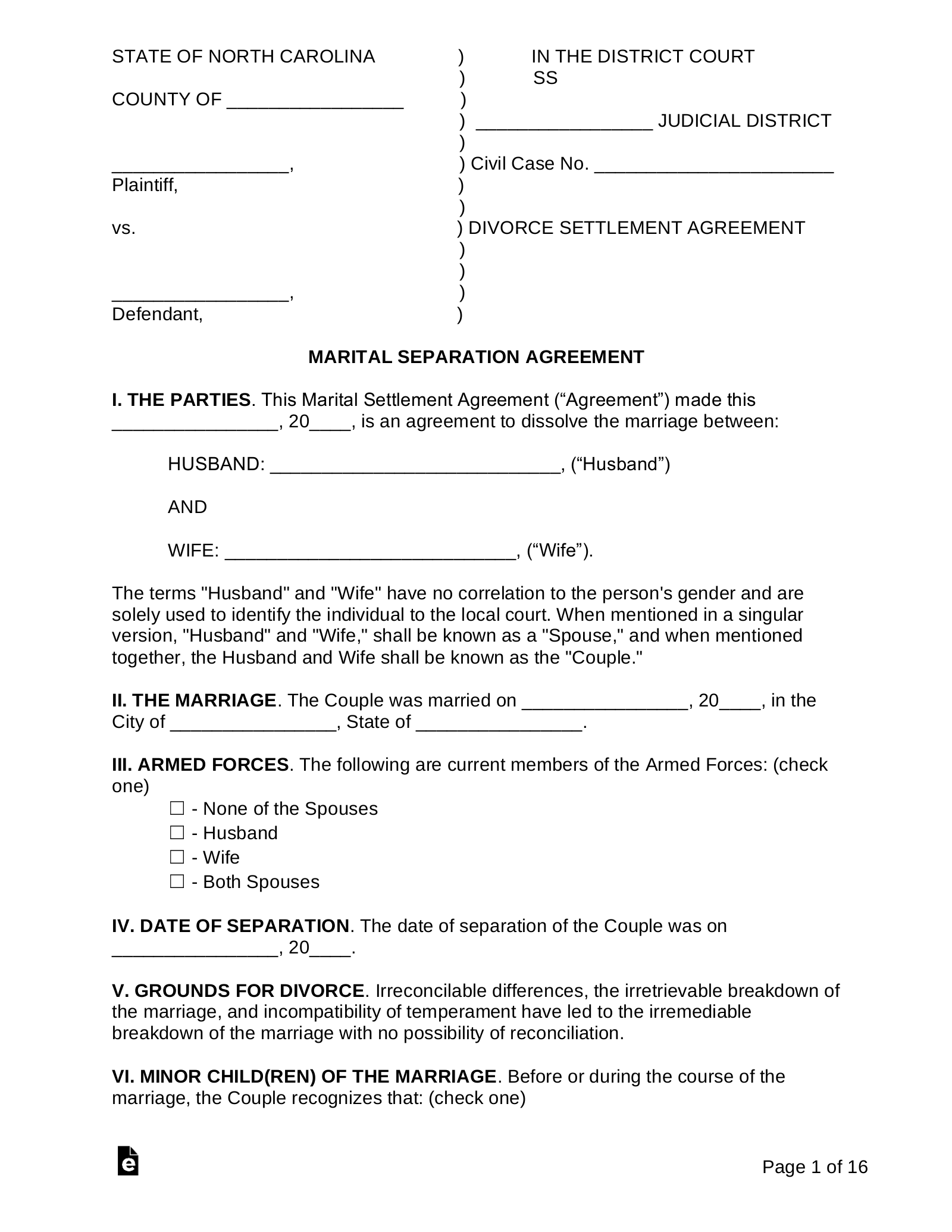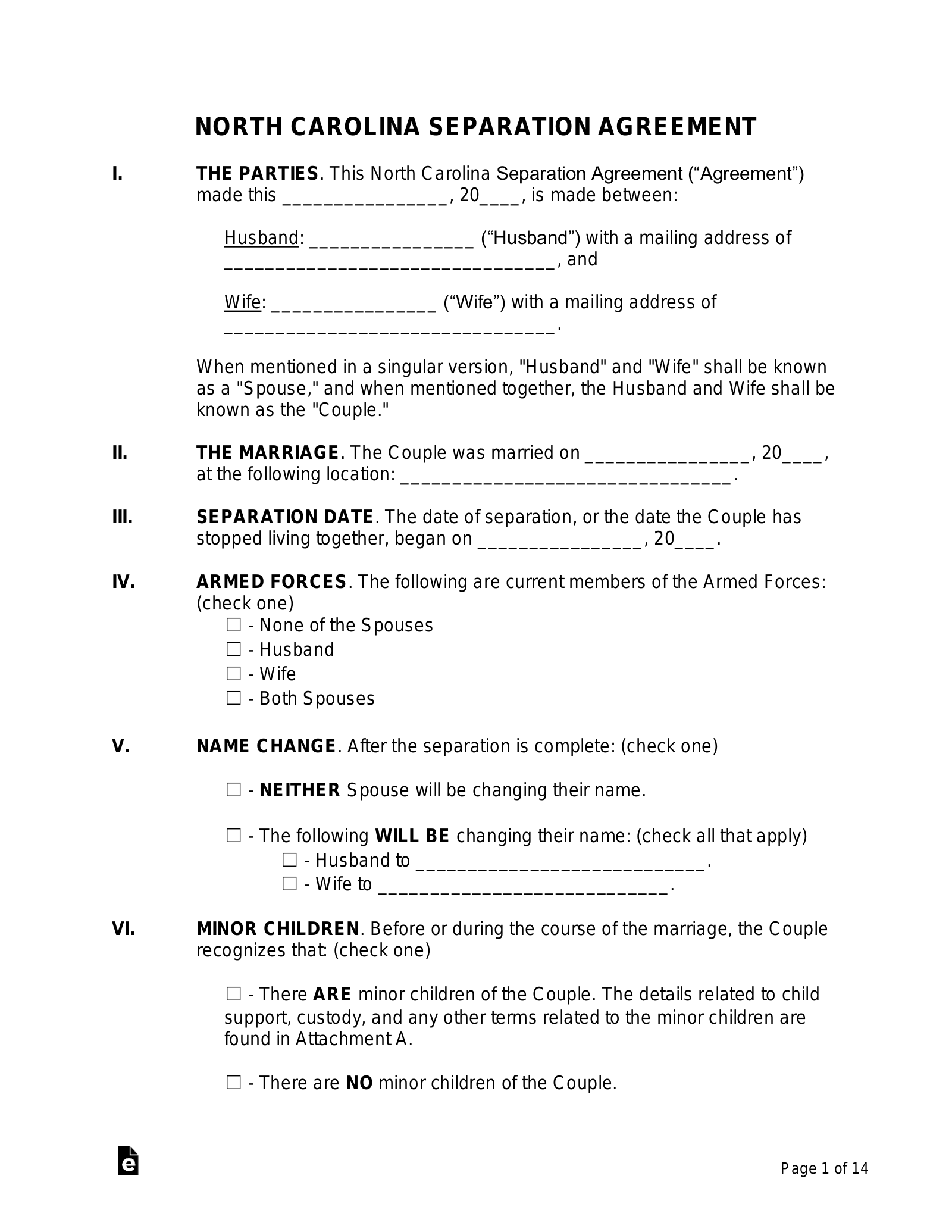Updated September 21, 2023
A North Carolina custody agreement, or parenting plan, outlines parental rights, responsibilities, and physical custody arrangements for a child. It usually exists under divorce and separation proceedings that involve minor children. The child must live in North Carolina for at least six months before the custody case, and the petition must be filed in the child’s primary home county.
Child Custody Factors
The North Carolina court considers the following factors when determining custody:
- The child’s safety;
- The history of domestic violence in the household (if applicable); and
- The parents’ safety from domestic violence committed by the other parent.
Statute: § 50-13.2(a)
Table of Contents |
How to File for Custody in North Carolina
Follow these step-by-step instructions to file for child custody in North Carolina. Note: Although some of these forms have “Wake County” in their titles, the state court system has approved them for use in any of the state’s counties.
1. Agree on a Parenting Plan
Prior to filing for custody, parents should try to reach an agreement on the terms of custody, such as scheduling, each parent’s rights and responsibilities, visitation, and more. In North Carolina, the following custody arrangements are recognized:
- Sole legal custody
- Joint legal custody
- Sole physical custody
- Joint legal custody
2. Calculate Child Support
Under the North Carolina Child Support Guidelines, the amount of child support awarded by the court will be determined by each parent’s income, existing obligations for other children, childcare costs, and other relevant factors.
For a primary custody case, in which one parent has primary physical custody of the children involved, Worksheet A can be used to estimate the amount of child support that may be awarded by the court.
For joint or shared custody, Worksheet B can be used to calculate child support.
3. Complete Required Documents
Download and fill out the following forms. Handwriting and typing are both acceptable. Make three copies of each form. Note that, although some of the forms say “County of Wake,” they are approved by the state’s judicial branch for use in every one of the state’s counties.
- Custody Complaint Coversheet
- Civil Summons (AOC-CV-100)
- Domestic Civil Action Cover Sheet (AOC-CV-750)
- Complaint for Child Custody/Visitation (requires notarization)
- Affidavit as to Status of Minor Child (AOC-CV-609)
- Affidavit for Judicial Assignment and Notice of Hearing (WAKE-DOM-02)
- Custody Mediation Cover Sheet (WAKE-DOM-06)
- Order to Attend (WAKE-DOM-07A Temporary)
- Affidavit of Service of Process (WAKE-CIV-02) (if applicable)
- Affidavit re: Servicemembers Civil Relief Act (if applicable)
4. File Documents with County Clerk
Once signed and notarized (as needed), file all forms with the local county clerk. The clerk will register the documents and return the following documents to the petitioner:
- Affidavit for Judicial Assignment and Notice of Hearing (WAKE-DOM-02),
- Custody Mediation Cover Sheet (WAKE-DOM-06), and
- Order to Attend (WAKEDOM-07A).
The petitioner pays any associated filing fees.[1]
5. File Forms with Family Court Office
File the three documents above with the Family Court Office. That office will issue a judicial assignment and a mandatory Custody Mediation Orientation date.
6. Serve the Defendant
Serve the defendant’s copies of the forms.[2] The petitioner can serve the documents personally (process server or Sheriff), by certified mail, delivery service,[3] or by publication (last resort).
- A process server or Sheriff will complete the “Return of Service” section on the back of the Civil Summons (AOC-CV-100) and re-file it with the county clerk.
- If the petitioner uses certified mail or delivery, they must submit an Affidavit of Service of Process (WAKE-CIV-02) to the county clerk.
- If the petitioner has to resort to publication, they must submit an Affidavit of Due Diligence (Publication) and an Affidavit of Service of Process by Publication to the county clerk.
7. Orientation for Custody Mediation
Mediation is required for all custody and visitation cases in North Carolina unless specifically exempted by the court.[4] The county clerk will have added the orientation date to the Order to Attend (WAKE-DOM-07A Temporary) at the time of initial filing, which will be no more than 45 days from the filing date.[5] The parties will receive their mediation date at the end of the orientation.[6]
“Good cause” reasons for the court to exempt parties from mediation are:[7]
- Abuse or neglect of the minor child;
- Agreement between the parties for voluntary mediation;
- Alcoholism, drug abuse, or spousal abuse;
- Emotional, psychiatric, or psychological problems;
- Residing more than 50 miles from the court; and
- Undue hardship to a party.
8. Custody Mediation
The parties draft a parenting plan in the mediation. If both parties agree and the mediator approves, they file the proposed parenting plan with the court for the judge’s final approval.[8]
If the parties can’t agree, the mediator issues either a partial plan or a notice of “failure to create a plan.” The court schedules a hearing to review the evidence.[9]
9. Trial and Final Order
At the hearing and any subsequent hearings that may arise, the judge will consider all evidence put forward by the petitioner and the defendant. Based on the evidence, they will hand down a final ruling establishing the custody agreement for the child(ren).
Custody Laws
- Child’s best interests: § 50-13.2(a)
- Child born out of wedlock: § 10-7800
- Child conceived as a result of sexual assault: § 50-13.1(a)
- Child support: § 50-13.4, § 50-13.9
- Emergency custody: § 50A-204
- Grandparent visitation: § 50-13.2(b1), § 50-13.2A
- Mediation: § 50-13.1
- Medical care: § 50-13.11
- Modification: § 50-13.7
- Records access: § 50-13.2(b)
- Service members: § 50-13.2(f)
- Sobriety: § 50-13.2(b2)
- Uniform Child Custody Act: Chapter 50A
- Visitation: § 50-13.1(a), § 50-13.2(e)
Related Forms




